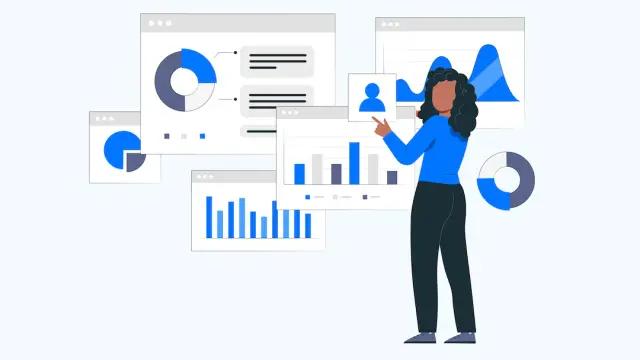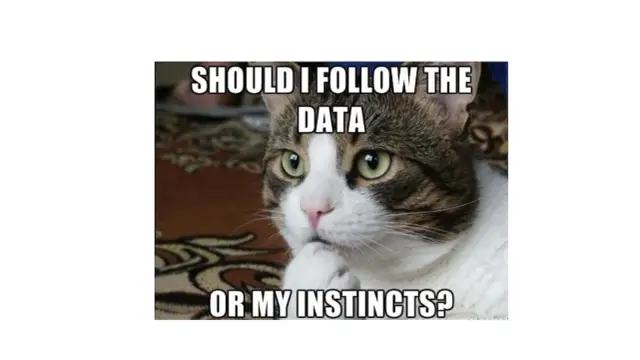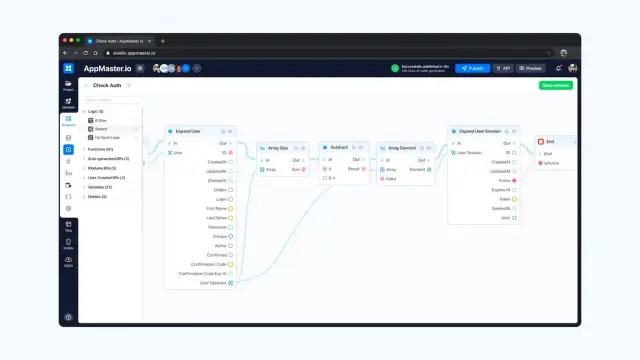Why No-code & Low-Code Data Science the Future of Data Science?
No-code makes it easy to access data, build models, deploy; this is the future wave and will enable anyone who wants to learn to become a data scientist.

The traditional data science pipeline is becoming increasingly complex and time-consuming. No-code and low-code data science platforms offer a more streamlined and efficient workflow that can help speed up the process of data science experimentation and deployment.
No-code and low-code data science platforms provide a visual drag-and-drop interface that doesn't require coding skills. This makes it easy for non-technical users to get started with data science without learning complex programming languages.
In addition, no-code and low-code data science platforms offer pre-built models and templates, saving time and effort compared to building models from scratch. These platforms also make it easier to deploy models into production, as they often come with built-in tools for model management and monitoring.
Overall, no-code and low-code data science platforms offer a more accessible and user-friendly way to carry out data science projects. As the demand for data science continues to grow, these platforms are likely to become increasingly popular as they offer a more efficient way to carry out data science experiments and deploy models into production.
What Is The definition of Data Science?
Data Science is the study of data. It involves extracting information from data and using it to solve real-world problems. Data Science is a process that uses scientific methods, algorithms, and systems to extract knowledge and insights from data.
The goal of Data Science is to make better decisions by understanding data. Data Science can be used in any field where there is data, such as medicine, finance, marketing, and manufacturing. Some common techniques used in Data Science include machine learning, statistical analysis, and data mining.

How does Data Science Works?
- Data Collection - This is the first and foremost stage of collecting data from various sources. This data can be in the form of structured, unstructured, or semi-structured.
- Data Pre-processing- This is the stage where the collected data is cleaned and made ready for further analysis. Data pre-processing includes tasks like data imputation, normalization, etc.
- Data Analysis- In this stage, various methods are applied to the processed data to gain insights. Data analysis techniques can be both descriptive and predictive.
- Data Visualization- This is the final stage where the insights gained from the data are represented in a graphical or pictorial format. Data visualization helps in a better understanding of the data and also aids in decision-making.
Is data science possible without coding?
Since there is no particular definition for data science, there are multiple views on this subject. Some experts say data science without coding is possible, while others disagree. There are a few key reasons why some people believe data science without coding is possible. Firstly, data science generally deals with extracting insights from data.
This can be done through visual programming tools, which do not require coding. Secondly, there are many pre-built models and algorithms available that data scientists can use without having to write any code. Finally, with the rise of artificial intelligence (AI) and machine learning (ML), it is becoming increasingly possible to get insights from data without writing code.
On the other hand, there are also a few reasons why some people believe data science without coding is impossible:
- To understand and manipulate data, some level of coding is often necessary.
- Coding is usually required to build custom models and algorithms.
- Even with the rise of AI and ML, these technologies still require some level of coding in order to be used effectively.
Overall, there is no right or wrong answer to this question. It ultimately depends on the particular definition of data science and the individual preferences of data scientists.
Which coding is best for data science?
There is no single answer to this question. Different coding languages are better suited for different tasks within data science. Some of the most popular coding languages for data science include Python, R, and MATLAB. Each has its strengths and weaknesses, so it's important to choose the right language for the specific task at hand. Python is a versatile language popular for its ease of use, while R is a powerful statistical programming language. MATLAB is a popular choice for data visualization and machine learning. Ultimately, the best coding language for data science is the one that best suits your needs.
Generally, Python is considered the best coding language for data science, although others are also popular among data scientists. The main reason Python is so popular is that it is relatively easy to learn compared to other languages and has a huge range of libraries and tools available to support data science tasks. Additionally, Python is widely used in many other fields, such as web development, so finding people with the skills you need is relatively easy. However, there are also some drawbacks to using Python, such as being slow compared to languages like C++.
Do data scientists use VS code?
Yes, many data scientists use VS code because it is a popular, open-source code editor that offers great features and extensions for data science. Some features that make VS code ideal for data science include its support for Jupyter notebooks, integration with popular data science libraries, and built-in debugging and visualizing data features. Plus, VS code is highly customizable so that data scientists can tailor it to their specific needs and workflows.
It also has features such as syntax highlighting, code completion, and debugging tools. While many IDEs (Integrated Development Environments) are available for data scientists, VS code is a popular choice due to its ease of use and flexibility.
Does data science have more coding?
There's no doubt that data science has become one of the hottest fields in recent years. A quick search on job websites will reveal thousands of open positions for data scientists, and the median salary for these roles is well above average. But what does it really take to be a data scientist?
One of the most common misconceptions about data science is that it requires a lot of coding. This couldn't be further from the truth! While coding is certainly a valuable skill for data scientists, it's not nearly as important as many think.
So, if coding isn't the most important skill for data scientists, what is? The three most important skills for data scientists are:
- Math and statistics
- Machine learning
- Data visualization
These skills are far more important than coding for data scientists, and they're the skills that you should focus on if you're interested in a career in data science. Of course, that's not to say that you shouldn't learn to code as well. Coding is still a valuable skill for data scientists, and it can make your life a lot easier when working with data. But if you're not a natural coder, don't worry – there's no need to learn to code before starting your career in data science. Just focus on honing your math, statistics, and machine learning skills, and you'll be well on your way to a successful career in data science.
Why no-code development platforms are on the rise?
In recent years, there's been a rise in the popularity of no-code platforms. These platforms allow users to create websites, apps, and other digital products without any coding knowledge.
There are a few reasons for the popularity of no-code platforms:
- They're much easier to use than a traditional coding approach.
- They're often more affordable.
- They allow users to create products without any technical skills.
No-code platforms have many potentials. They can help people create websites and apps without any coding knowledge. And they can also help businesses save money on development costs. But no-code platforms aren't perfect. There are some limitations to what you can create with them. And they're not always easy to use. If you're considering using a no-code platform, it's important to do your research and understand the pros and cons before making a decision.
How can no-code and low-code platforms help businesses?
No-code and low-code data science can collect data for businesses of all sizes. It can allow employees to analyze data and find trends without needing a lot of coding experience. No-code technology can help businesses save time and money while still getting accurate insights.
Businesses can use no-code and low-code data science for various tasks, including customer segmentation, predictive maintenance, and fraud detection. No-code platforms are particularly well suited for tasks that require a lot of data preparation, such as data cleansing and feature engineering. Low-code platforms are better for more complex analysis that requires custom coding. AppMaster can do this just as well as a low-code platform, despite being a no-code platform.

What is AppMaster? (No-Code Development)
AppMaster is a no-code development platform that enables anyone to create custom mobile apps, web apps, and backend without writing a single line of code. With AppMaster, you can quickly and easily build native iOS and Android apps from scratch to suit your specific needs.
There's no need to hire a costly development team or learn complex coding languages. AppMaster does all the hard work for you, so you can focus on what's important - designing and launching your dream app!
Why Do You Need AppMaster?
There are many reasons why you might want to use AppMaster to build your app. Perhaps you have a great idea for an app but don't know how to code it. Or maybe you're looking for a faster, easier, and more cost-effective way to develop an app than working with a traditional development team.
Whatever your reason, AppMaster can help you turn your vision into reality. With our platform, you can create beautiful, custom apps without any prior coding experience. And because we offer a wide range of blocks in business process editor and customization options, you can be sure to find a solution that perfectly suits your needs. Moreover, our team of experts is always on hand to help you every step. So, if you need assistance, contact us, and we'll be happy to help.
Conclusion
The future of data science is no-code and low-code because it enables anyone to build powerful data models and algorithms without needing to write a single line of code. This means that data science can be democratized, and everyone can access the tools and techniques needed to make data-driven decisions.
No-code and low-code data science also offer several other benefits, including rapidly prototyping and iterating on models and easily integrating with existing systems and workflows. In addition, no-code and low-code data science platforms are often much cheaper and easier to use than traditional data science tools, making them ideal for small businesses and startups.





